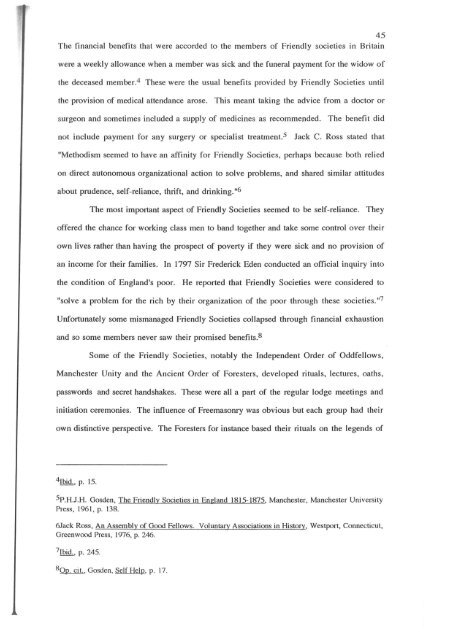TRANSPLANTED IRISH INSTITUTIONS - University of Canterbury
TRANSPLANTED IRISH INSTITUTIONS - University of Canterbury
TRANSPLANTED IRISH INSTITUTIONS - University of Canterbury
Create successful ePaper yourself
Turn your PDF publications into a flip-book with our unique Google optimized e-Paper software.
45<br />
The financial benefits that were accorded to the members <strong>of</strong> Friendly societies In Britain<br />
were a weekly allowance when a member was sick and the funeral payment for the widow <strong>of</strong><br />
the deceased member. 4 These were the usual benefits provided by Friendly Societies until<br />
the provision <strong>of</strong> medical attendance arose. This meant taking the advice from a doctor or<br />
surgeon and sometimes included a supply <strong>of</strong> medicines as recommended. The benefit did<br />
not include payment for any surgery or specialist treatment. 5<br />
Jack C. Ross stated that<br />
"Methodism seemed to have an affinity for Friendly Societies, perhaps because both relied<br />
on direct autonomous organizational action to solve problems, and shared similar attitudes<br />
about prudence, self-reliance, thrift, and drinking."6<br />
The most important aspect <strong>of</strong> Friendly Societies seemed to be self-reliance. They<br />
<strong>of</strong>fered the chance for working class men to band together and take some control over their<br />
own lives rather than having the prospect <strong>of</strong> poverty if they were sick and no provision <strong>of</strong><br />
an income for their families. In 1797 Sir Frederick Eden conducted an <strong>of</strong>ficial inquiry into<br />
the condition <strong>of</strong> England's poor. He reported that Friendly Societies were considered to<br />
"solve a problem for the rich by their organization <strong>of</strong> the poor through these societies."7<br />
Unfortunately some mismanaged Friendly Societies collapsed through financial exhaustion<br />
and so some members never saw their promised benefits. 8<br />
Some <strong>of</strong> the Friendly Societies, notably the Independent Order <strong>of</strong> Oddfellows,<br />
Manchester Unity and the Ancient Order <strong>of</strong> Foresters, developed rituals, lectures, oaths,<br />
passwords and secret handshakes. These were all a part <strong>of</strong> the regular lodge meetings and<br />
initiation ceremonies. The influence <strong>of</strong> Freemasonry was obvious but each group had their<br />
own distinctive perspective. The Foresters for instance based their rituals on the legends <strong>of</strong><br />
4Ibid., p. 15.<br />
5p.H.J.H. Gosden, The Friendly Societies in England 1815-1875, Manchester, Manchester <strong>University</strong><br />
Press, 1961, p. 138.<br />
6.Jack Ross, An Assembly <strong>of</strong> Good Fellows. Voluntary Associations in History, Westport, Connecticut,<br />
Greenwood Press, 1976, p. 246.<br />
7Ibid., p. 245.<br />
Sop. cit., Gosden, Self Help, p. 17.
















